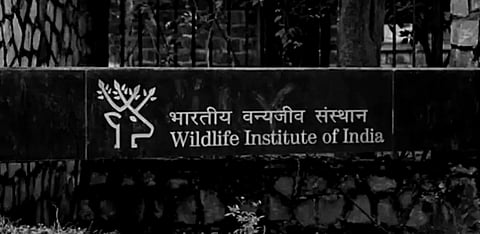

This is the first time the union environment ministry has required an autonomous institute operating in the conservation science sector to have its findings and publications approved.
—–
THE Wildlife Division of the Union Ministry of Environment, Forest and Climate Change (MoEFCC) recently wrote a letter to the Wildlife Institute of India ('WII') in Dehradun with a relatively innocuous subject line: "Publication of documents by Wildlife Institute of India- approvals-reg." The seemingly regular subject line masked the fact that the union government was directly asking an autonomous body to run its scientific results by officialdom before making them public.
This is the first time the union environment ministry has required an autonomous institute operating in the conservation science sector to have its findings and publications approved.
With the slogan 'minimum government, maximum governance', Prime Minister Narendra Modi's grand vision for the nation's development is a corollary to the ministry's decision regarding WII, Dehradun, which is itself an autonomous institute.
Autonomous bodies are formed when it is thought that some duties should be undertaken outside of the governmental set-up with some freedom and flexibility, without the day-to-day involvement of the governmental apparatus.
WII, founded in 1982, is an internationally acclaimed institution that provides training, academic courses and consultancy services in wildlife research and management. On May 22, 1982, the government recognised the Institute as a subordinate entity under the Union Ministry of Agriculture. It was recognised as an autonomous entity under the Wildlife Division of the Department of Environment, Forests and Wildlife four years later, on February 11, 1986. The Institute is now part of the MoEFCC's wildlife unit and is sponsored by it.
“WII has frequently been commissioned by the union government and various courts to examine the impact of development activities and projects, and to produce strategies to mitigate their effects on biodiversity.
The Institute is actively engaged in research on biodiversity-related issues across the country. It has been awarded the Rajiv Gandhi Wildlife Conservation Award. WII-trained personnel have helped to research and conserve wildlife in India. The National Tiger Census, or the All-India Tiger Estimation, is done by WII jointly with the National Tiger Conservation Authority and state forest administrations.
India is one of the world's mega-biodiversity countries. It is also the world's largest tiger range country, with more than 70 per cent of the worldwide tiger population. The country's tiger population has increased from 1,411 in 2006 to 2,967 in 2019; subsequently, other species are doing well. This necessitates a significant amount of effort that includes everything from legislation to funding and from protection to scientific research. The latter is the most important because every effort has a bearing on it.
WII has frequently been commissioned by the union government and various courts to examine the impact of development activities and projects, and to produce strategies to mitigate their effects on biodiversity. The union government has always been on the side of preserving biodiversity, and India has a solid track record in this regard. So, how did the concept of prior checking enter the minds of executives?
Prime Minister Modi, in 2019, before the COVID-19 pandemic hit the global economy, had sought to make India a $5 trillion economy by the financial year 2024-2025. However, according to the International Monetary Fund, India's nominal Gross Domestic Product might climb to $4.92 trillion in the financial year 2028-29, which is a four-year delay. Maintaining the pace of economic growth while conserving biodiversity poses a genuine problem for every government.
To understand the issue, we must take some recent developments into consideration. A petition was filed in the Supreme Court on July 15, 2019, in the matter of M.K. Ranjitsinh & Ors. versus Union of India & Ors., requesting the government to conserve two species of birds located in the region – the Great Indian Bustard and the Lesser Florican – both of which are on the verge of extinction. The petition also requested that the state governments of Rajasthan and Gujarat prohibit the installation of overhead power lines, and the building of windmills and solar equipment in prospective bird habitats identified by the WII's 2018 report Power Line Mitigation to conserve Bustards.
In another case, the same report dragged the government into trouble, with a complaint filed at the National Green Tribunal in April 2019, which cited the WII research. It was expressed that, as per the report, one lakh birds die each year after flying into overhead electricity lines.
In yet another instance, a recent WII study indicated more reasons to criticise the government. A WII assessment suggested a moratorium on new mines in the Hasdeo-Arand coal fields in Chhattisgarh, but the union and state governments ignored it.
“A recent WII assessment suggested a moratorium on new mines in the whole Hasdeo-Arand coal fields in Chhattisgarh, but the union and state governments ignored it.
However, these reports may not be the only reason for the ministry's action pertaining to the WII. The ministry should address the above concerns as soon as possible, as well as how such a unilateral move would benefit wildlife conservation in India.
Good and inclusive governance should be reflected in every organ of government. Saudi philosopher, neuroscientist, and geostrategist Nayef Al-Rodhan, in his 2009 book 'Sustainable History and the Dignity of Man: A Philosophy of History and Civilisational Triumph', proposed eight minimum criteria for ensuring good governance. Three of the standards are government legitimacy, accountability, and transparency. Moreover, the father of the nation, Mahatma Gandhi, rightly said, "The world has enough for everyone's needs, but not enough for everyone's greed."
The ideas of Mahatma Gandhi on natural resources, and the Al-Rodhan form of governance may aid the MoEFCC in developing policies and decisions for wildlife conservation in India.